- Home
- Cherie Priest
The Inexplicables (Clockwork Century) Page 11
The Inexplicables (Clockwork Century) Read online
Page 11
All three boys hid, but peeked over the edge of the sill down at the street below.
To the west of their hiding spot was the empty shell of a building without a roof. Or, to be more precise, the roof had fallen down inside it and now served as a very uneven, none-too-attractive floor. This floor had a large hole at one end, though where this hole disappeared to was anybody’s guess.
Houjin kept his voice low. “That place used to be called McKinnen’s; it was a dry goods store. It was too far gone to shore up and save. Not enough structure to seal it or make it useful.”
“Someone thinks it’s useful,” Rector muttered back.
“Looks like it,” Zeke said, almost too loudly. “What’s going on down there?”
They craned their necks, still trying to keep from being seen. Their shoulders knocked together and their knees jockeyed for position. Fragments of ancient broken glass scattered under their grasping, brushing fingers.
In the ruins of McKinnen’s, no more than thirty yards away, two men were backing up toward the hole in the former roof. Each man held a rectangular metal shield that looked as though it had been pounded out of tin. With these shields, the men pushed, knocked, and otherwise pressed four staggering, unsteady men away from themselves and the hole.
“Rotters!” Zeke said in a voice too high pitched to call a whisper, and not loud enough to call an exclamation.
“Fresh ones!” Houjin said back. His eyebrows crowded close together behind the visor. “Real fresh.”
“What are those two guys doing?” Rector asked. “The ones with those … shields, or whatever they are.”
Houjin breathed, “I don’t know…” as if it were something he didn’t often say. “It’s like they’re … they’re herding those rotters away from that hole. You know what, I bet you it goes down to the underground. They’re just trying to get away from the rotters. I think that’s all.”
Rector adjusted his position so he could scratch at his hands some more. “Why don’t they shoot them?”
It was a good question. Neither of the boys had an answer.
Zeke smacked Rector’s fingers away from one another in a vain attempt to keep him from scratching, then said, “The fellows with the metal plates have masks on. The other guys don’t, but they haven’t been rotters more than an hour. Look at ’em—their clothes ain’t even torn yet. Maybe they had some kind of accident.”
With worry dripping from every word, Houjin said, “The cave-in. It must’ve been worse than we thought. They were poisoned by the air downstairs.”
Rector said, “That don’t explain what they’re doing in the middle of that old shop.”
One rotter fell out of the ruins and into the street, and another was kicked away by the shield bearers. One at a time, the two masked men backed down into the hole—using their metal plates to hold the new rotters at bay—and disappeared. With a loud, fumbling clank and crash, a door was slammed into place from somewhere below.
The hole vanished, and the rotters were left to mill about, groaning and griping.
They wandered away in a small, sad pack, and were gone.
Rector, Houjin, and Zeke stared after them until the shambling men could no longer be seen through the fog, then they waited a little longer, until they could no longer hear the things, either. When the coast was clear, Zeke let out a nervous laugh and pulled himself to his feet. “That’s just about the damnedest thing I ever seen!”
Houjin shook his head in disbelief, not disagreement, but Rector didn’t get it. “What was weird about it? Rotters are weird, sure. But I thought people down here … got used to them. Those two fellows in masks, they were used to them.”
Zeke said, “People who are used to ’em don’t shove them around with big metal plates. They shoot them in the head and call it a day.”
“It’s true,” Houjin assured Rector. “That … that was … exactly what you said. Weird.” Then he fell silent.
Zeke didn’t seem to notice, and Rector didn’t want to push. He’d gotten enough bad news already, and there was still a bogeyman to meet. “Weird or not, we’ve got an appointment, don’t we? Get me down to see this guy.”
“Right,” Houjin said firmly. He looked glad to be given a new train of thought. “Not much farther.”
“You keep saying that.”
“It keeps being true. Down some more stairs, across the street, and into the Smith Tower.”
Zeke chimed in, “And then it’s a straight shot to the Station.”
This time, Rector’s guides were as good as their word, though the truth of the matter didn’t make crossing the street any less nerve-racking given the blind corners, the soup-thick fog, and the fresh knowledge of rotters in the area. But everyone stayed quiet and all heads were kept down, and soon they were back underground beneath the tall, white tower.
In the meantime, Rector concentrated on putting one foot in front of the other. It took more focus than it should have, but Rector wasn’t merely tired, and he wasn’t merely battered. He was also dogged by the old yearning tugs of sap, and it made him cranky. Now that he was up and around, just thinking about it made his head ache and swell. He felt the exaggerated sensation of his cheeks inflating, stretching the gas-mask straps and squeezing his skull. He tasted that peculiar yellow stink in the back of his throat, down past his tongue. He experienced the ghost-pains of his simmering blood, wanting to be seared like lightning.
Visiting Yaozu might be a good thing. Yaozu had plenty of sap.
As Rector followed Zeke and Houjin down streets that felt like mining tunnels, across tracks for carts, and around the more heavily populated corners of the Station, he began to plot. He could try negotiation. Barter. Begging. All the usual tricks. Sap couldn’t be that hard to come by, there at the source.
Houjin announced, “We’re here! This is the lift.”
“And this will take us into the Station?”
“Yep.” Zeke hesitated, looking embarrassed—even behind the mask. “But you know how it goes, Huey: This is where I turn around. Momma will kill me if I go any deeper.”
Rector snorted. “Still obeying your momma? At your age?”
“You’ve met her. ’Sides, Yaozu wants to see you, not me. He don’t have no use for me—he’s told me so himself.”
“Lucky you.”
Zeke shrugged. “You might get lucky, too. Huey, I’ll see you when you come back around, huh?”
“Sure. I’ll bring him back. Let him go to bed, if that’s what he wants.”
Rector didn’t like being talked about as if he wasn’t there, but all he said was, “Later, Zeke. Give my regards to your momma.”
“You don’t mean it, so I won’t bother.”
“Suit yourself.”
On that note, Zeke turned back the way he’d come. Houjin unhooked a retracting metal gate and slid it aside. “After you,” he said.
Once Rector was on board, Huey joined him inside. He closed the gate again, pulled a lever, and together they swayed slightly as the lift jerked, then started its descent.
While they dropped—a bit too fast for Rector’s liking, but at least it wasn’t stairs—Houjin peeled his gas mask off and drew a deep breath. He let it out, then said, “You can take yours off, too, now. It used to be that you could go from the Vaults to the Station without wearing one, but we’ve had so many problems lately … it’s just not safe.”
“Nothing’s safe down here. That’s what it looks like to me.”
“Looks aren’t everything.”
“They’re something.”
Houjin closed his mouth and left his hand on the lever as he stuffed his mask into the back of his pants. Likewise, Rector removed his own. It came off his face with a sucking noise that made him want to retch.
He tossed his head back and forth and combed his fingers through his hair. It was wet with sweat where the straps had held the mask steady, and everything felt like it needed to be washed. That damn Blight gas made everything slick and dirty; th
ere was no getting away from it.
He glanced at his hands and grimaced. They bled at the knuckles and along their backs where he’d rubbed them against his pants in a desperate and futile effort to relieve the itching.
“You think that nurse in the Vaults will have some cream for this?”
The lift stopped with a bump and a clatter. Houjin opened the gate and held it for Rector, who exited into a shockingly ornate corridor.
“Maybe.”
Long red runners followed the length of a marble-tiled hall, and gold brocade paper covered the walls in a fuzzy, lustrous pattern. Gas-lamp sconces hung in pairs, but they weren’t hooked up to gas. Even a technological know-nothing like Rector could see that they’d been refitted for electric lights, and these glass bulbs burned hot, sparking and fizzing almost like the candles or lanterns they’d been designed to replace.
“Wow. Get a gander at this place!” Rector exclaimed.
“I’ve seen it before.” Houjin closed the gate to the lift and started off down the hall to the right, but Rector didn’t follow him. Not immediately.
“Hey, what’s up with you, anyway?” he asked. “Why’d you get so quiet on me?”
“I’m thinking.”
“Is that the only time you’re quiet? Because this is the first time you’ve shut up since I woke up.”
Houjin stopped and turned around. “Why do you care? You haven’t been listening.”
“I’ve been listening some. But now you’re mad, and it’s making me squirrelly.”
“I’m not … mad,” he argued, calculating the worth of the word, and discarding it. “I’m worried.”
“About me?”
“Hell no. Something else. I’ll tell you later.”
Rector said, “Fine,” and this time when Houjin continued down the hall, Rector followed him. He caught up and found himself worrying, too, but not knowing why. There were so many goddamn things to worry about in this place, it was hard to tell them all apart.
Houjin reached a pair of huge metal doors, painted with a mural that looked fresh from a museum, with seals, orcas, and eagles presented in shimmering pastels. He would’ve stopped to stare, but Houjin pushed against the doors and they split down the middle, cutting the scene in two.
“Yaozu’s quarters are this way. They used to be Minnericht’s, but Yaozu moved in when Minnericht died.”
“Took over the guy’s home and business both, did he?”
“Look at this place. Wouldn’t you?”
The floor was marble, peppered with lush rugs in a variety of bright colors. Rector wasn’t sure if he should step on them or not; they looked foreign and expensive. Then again, if you were going to put something on the floor, you had to expect people to walk on it, didn’t you?
Guided by this rationale, he quit avoiding the rugs and started watching his surroundings. He noticed for the first time how high the ceilings were, and how they were covered with ornate tin tiles. “This place,” he observed, “is too pretty to be underground.”
“Underground people don’t deserve pretty things?”
“I didn’t say that. I meant it’s unusual. Don’t get your dander up.”
“I don’t know what that means,” Houjin admitted.
“It means don’t take no offense, ’cause I didn’t intend any.”
“All right, I won’t. And … we’re here.”
They entered a large room with a fireplace and a table that might’ve been used for dining if it hadn’t been covered with books and candles. A pair of reading spectacles were folded neatly atop a stack of papers.
“We’re where?”
Houjin answered vaguely. “This is where he takes visitors. I’ll be waiting in the lobby.”
“The lobby? Where’s that?” Rector didn’t like the soft tremor of panic in his words, but there was nothing to be done about it now.
“It’s where people would’ve waited for the trains, if the trains had ever come. There are benches, and ticket counters, and things like that.” Now Houjin was the one who sounded weary, though Rector preferred to think that the boy was only thinking. That’s what he’d told him, after all.
“You’re just going to leave me here?”
Before Houjin could answer, a faint padding of footsteps echoed from the corridor.
Both boys looked to the entryway and were soon rewarded by the sight of a Chinese man wearing white. The newcomer was an inch or two taller than Rector; somehow his clothes both fit him well and flowed around him like a pale and dancing shadow.
Rector tried not to stare. “Yaozu?” He immediately felt dumb for putting a question mark on the end.
“Ah, yes. Rector Sherman. There you are. Thank you for coming.”
“Um … you’re welcome?”
Yaozu’s English sounded better than Houjin’s, which was saying something. He spoke Chinese to Houjin, who nodded and flashed Rector a half smile that Rector couldn’t return, no matter how hard he tried: it battled his mood, and came out as a grimace instead.
“See you later,” Houjin promised.
And then he bowed a hasty departure that left Rector and Yaozu alone together in the big meeting room, which suddenly felt rather warm.
Ten
Rector stood there shifting from foot to foot while Yaozu appraised him. The boy was tired of being appraised. It made him feel like somebody’s horse. Under different circumstances, he might’ve opened his mouth about it, but not here, and not now. Not to this fellow, who folded his arms and pursed his lips like he was considering what he wanted, and what to ask, and how to proceed.
To start, Yaozu suggested, “Why don’t we sit down? Join me at the table, and we’ll have a conversation.”
“About what?”
“You. Coming here. What you want, what you expect. What use you can be.”
“To you?”
As if he were mildly surprised, Yaozu said, “To the city, of course. Think of it that way. If you aren’t any use to the city, then you aren’t any use to me.”
“I heard Zeke isn’t any use to you.”
“That’s true, he’s not. It’s strange, really. Given his parentage, you’d think he’d show more … potential. However, given that his mother is so popular with the Doornails, there’s no sense in throwing the lad back over the wall.”
Rector squirmed. “Aw, Zeke’s not so bad.”
“If I thought he was, I’d have done something about it. But you’re not here to talk about Zeke. You’re here to tell me what you’re doing inside my city. So far as a land of opportunity goes, you could’ve picked greener pastures.”
Rector shrugged. He did his best to hold eye contact, but it was hard. Yaozu had a stare that could pierce granite. “I … I turned eighteen, and got thrown out of the orphan’s home. Didn’t know what to do, or where to go,” he said, repeating the line he’d been feeding to others.
Yaozu steepled his fingers, and leaned back in the chair. After a few seconds of uncomfortable silence, he said, “I believe … most of that.”
Rector fidgeted in his seat, a hard-backed wooden thing that hadn’t been designed for comfort. He tapped his foot against the nearest table leg, then stopped himself and asked, “What part don’t you buy?”
“The part you aren’t selling. Did you come here because of Zeke, or because of the sap market? I know you were selling it, in the Outskirts. Big Pete Holloway said one of his boys supplied you, and that you did a fair amount of business with Harry, the chemist from Vancouver who set up shop in the Outskirts.”
“I did better than fair,” Rector argued, on the off chance this was some kind of job interview.
“No, let’s leave it there. If you hadn’t smoked up most of your profits, we could perhaps call it good.”
Rector swallowed. He couldn’t think of a reply, so he didn’t give one.
“It’s written all over your body,” Yaozu continued. “Your skin—the color’s changing, very slightly, around your eyes and mouth. Your gums are receding.
Your hair, it’s very exuberant. But it’s been falling out, hasn’t it?”
“Maybe.”
“Maybe,” Yaozu echoed with something perilously close to disgust. “You’re a user, Rector. A longtime user with heavy appetites and, I’d wager, a rather serious addiction. Addicts aren’t any use to me, Rector. Do you understand? I can’t trust addicts. Their minds are too far gone for detail-oriented production work, and they steal too much when they sell.”
“I never stole anything.”
“You skimmed. Extensively. Please don’t insult me by lying about it.”
Rector didn’t like the way Yaozu said please. It didn’t sound like a request. It sounded like a bullet. “All right, I smoked and I sold. You want me to pay it back? I don’t even know how much I took over the last few years.”
Yaozu shook his head. He squeezed the spot between his eyebrows and sighed. Rector got the distinct impression he was giving this man a headache, and that headaches and Yaozu were probably a bad combination.
He continued, “I can work it off, if there’s debt you’re worried about. I’m an excellent salesman.”
“I bet you are. But since you’re now officially a grown man, with a troublesome birthday behind you, perhaps we can wipe the slate clean. Just this once. Consider it a birthday present.”
“What? Really?”
“It’s no great risk for me to make the offer. If you persist in being trouble, or making trouble, then I daresay the slate won’t stay clean for long. But should you feel inclined to turn over a new leaf, then there’s no time like the present. Tell me, Rector. Are you interested in a new leaf?”
“Yes sir. Very much, sir.” He’d never called a Chinaman “sir” before, but, like this whole leaf-turning thing, there was no time like the present to start.
He nodded slowly. “Well, that’s something. You still have the self-preservation to lie on the fly, so you’re not as far gone as I’d feared.”
“You … you’d feared?”
“I’d heard stories. About you.”
“From who?”
“Customers. Suppliers. For such a young man, Rector, you’ve developed quite a reputation. And lest you take that as a compliment, let me assure you it isn’t—it’s only an observation, and one that leaves me compelled to observe you further, in case your clean slate gets too dirty, too quickly. Let me put it this way: You appear inconvenient to me, Rector. And I am giving you the opportunity to prove otherwise. Now, under different circumstances, this would be the part where we talk about job prospects.”

 Maplecroft
Maplecroft Chapelwood
Chapelwood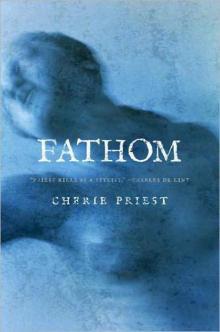 Fathom
Fathom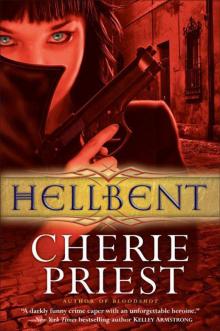 Hellbent
Hellbent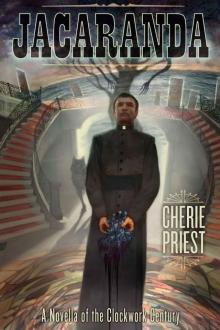 Jacaranda
Jacaranda Four and Twenty Blackbirds
Four and Twenty Blackbirds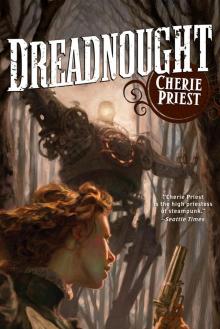 Dreadnought
Dreadnought Dreadful Skin
Dreadful Skin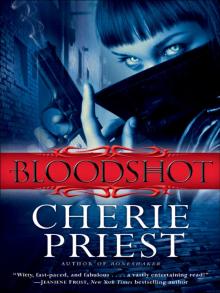 Bloodshot
Bloodshot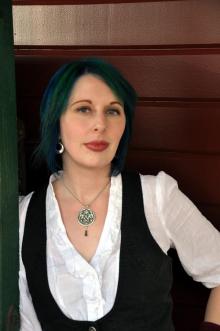 Tanglefoot
Tanglefoot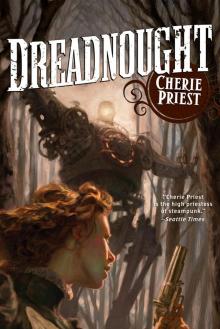 Clementine
Clementine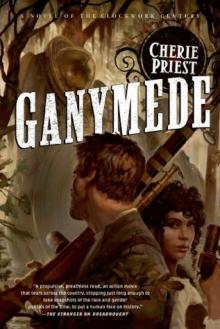 Ganymede
Ganymede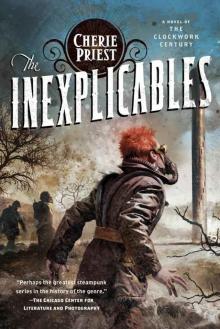 The Inexplicables
The Inexplicables Not Flesh Nor Feathers
Not Flesh Nor Feathers Wings to the Kingdom
Wings to the Kingdom Fiddlehead
Fiddlehead Tanglefoot: A Story of the Clockwork Century
Tanglefoot: A Story of the Clockwork Century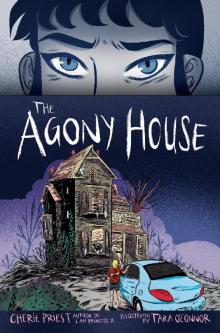 The Agony House
The Agony House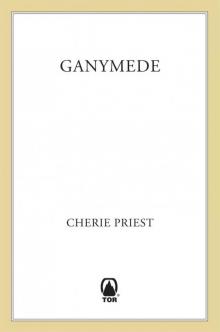 Ganymede (Clockwork Century)
Ganymede (Clockwork Century)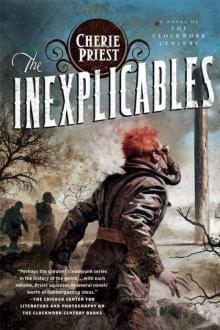 The Inexplicables (Clockwork Century)
The Inexplicables (Clockwork Century)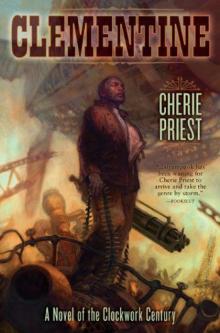 Clementine tcc-2
Clementine tcc-2 Grants Pass
Grants Pass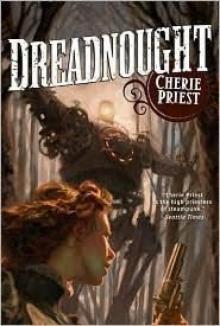 Dreadnought tcc-3
Dreadnought tcc-3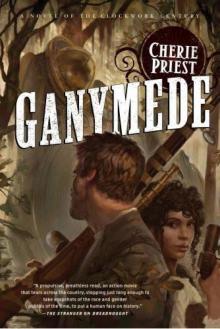 Ganymede tcc-4
Ganymede tcc-4